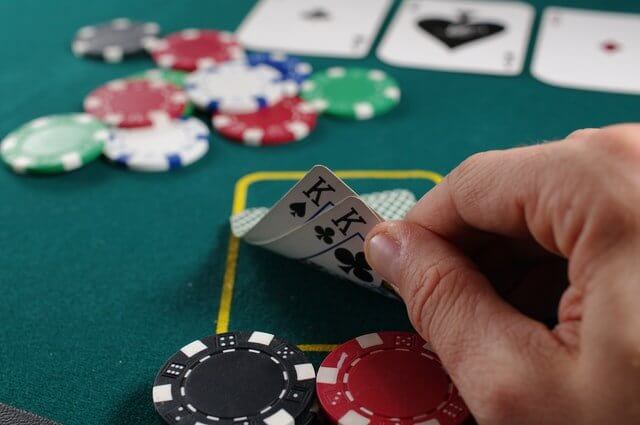Casino games such as those found in online casinos in Pennsylvania or NJ online casinos have statistical advantages to make sure “the house always wins”. But what’s all the hullabaloo about card counting? Is there a game where the player, with the right strategy, can turn the odds in their favor?
That game is blackjack. Read below to discover how card counting works, if it is legal, and strategies for card counting. More into slots strategies? Or maybe you prefer sports betting. Check out our parlays guide.
- The Mathematics Behind Card Counting
- Popular Card Counting Systems
- How to Learn Card Counting
- Card Counting Strategies for Blackjack
- Advanced Card Counting Techniques
- Challenges of Card Counting in Online Casinos
- Avoiding Detection: Stealthy Card Counting
- Ethical Considerations in Card Counting
- Legal Consequences and Risks: What Happens If You’re Caught Card Counting?
- Conclusion
- Frequently Asked Questions About Card Counting
What is Card Counting?
Card counting is a strategy used primarily in blackjack to track the ratio of high to low cards remaining in the deck. This method helps players make more informed decisions, such as when to bet high or play conservatively. The concept is based on the idea that certain cards, particularly high cards like 10s and Aces, are more favorable to the player than low cards.

By keeping a running count, players can predict the likelihood of favorable cards being dealt, giving them a statistical edge over the house.
History and Evolution of Card Counting
Card counting gained prominence in the 1960s after MIT professor Edward O. Thorp introduced the concept in his book Beat the Dealer. Thorp’s strategies revolutionized blackjack, demonstrating that card counting could shift the odds from the casino to the player. Over the decades, various card counting systems have emerged, ranging from simple methods like the Hi-Lo system to more complex strategies like Omega II. As card counting techniques evolved, so did casino countermeasures, leading to a cat-and-mouse game between players and casinos.
Legal Considerations: Is Card Counting Illegal?
Card counting is not illegal because it relies on skill rather than cheating or manipulating the game. However, casinos view card counting unfavorably and may take measures to prevent it, such as asking suspected counters to leave or banning them from the premises. In some jurisdictions, using external devices or software to aid in card counting is illegal. Players should understand the legal landscape and potential consequences before attempting to count cards in a casino.
The Mathematics Behind Card Counting
To understand the math behind card counting, grasp these key concepts.
Understanding Probability and Odds in Card Counting
Card counting relies heavily on understanding probability and odds. In blackjack, the deck composition changes with each card dealt, affecting the probability of drawing high or low cards. Card counters assign a point value to cards as they are dealt to track the running count, which helps them determine the odds of favorable cards appearing.

The higher the count, the more advantageous the situation for the player, allowing for strategic betting and playing decisions.
The Role of Deck Penetration
Deck penetration refers to how deep into the deck or shoe the dealer goes before shuffling the cards. Greater deck penetration allows card counters to have more accurate counts, as they have more information about the composition of the remaining cards. Typically, the deeper the penetration, the more reliable the count, and the greater the potential advantage for the player.
Importance of True Count in Card Counting
The true count is a crucial concept in card counting. It adjusts the running count based on the number of decks remaining in the shoe. For example, if the running count is +6 and there are three decks left, the true count would be +2. This adjustment is essential because it standardizes the count across different games with varying numbers of decks, providing a more accurate reflection of the player’s advantage.
Popular Card Counting Systems
Here are the most important card-counting systems to note.
The Hi-Lo System Explained
The Hi-Lo system is the most widely used card counting method due to its simplicity and effectiveness. In this system, cards 2-6 are assigned a value of +1, cards 7-9 are neutral (0), and 10s and Aces are -1. Players maintain a running count by adding or subtracting the assigned values as cards are dealt. A positive running count indicates a higher proportion of high cards remaining, signaling the player to increase their bets.
Other Systems: KO, Omega II, and Red Seven
While the Hi-Lo system is popular, other systems offer different advantages. The Knock-Out (KO) system is unbalanced, meaning it doesn’t require converting the running count to a true count, making it simpler to use. Omega II is a more advanced, balanced system with multiple values (+1, +2, -1, -2) for different cards, offering greater precision at the cost of complexity. The Red Seven system is an unbalanced approach that simplifies true count conversion and is particularly effective for single-deck games.
Comparing Different Card Counting Methods: Pros and Cons
Each card counting method has its pros and cons. The Hi-Lo system is straightforward but may not offer as much precision as advanced methods. KO is easier for beginners but slightly less accurate without true count adjustment. Omega II provides detailed precision but requires more mental effort and practice. Choosing the right system depends on the player’s experience level and the type of game they are playing.
How to Learn Card Counting
Learning card counting involves mastering a system and practicing until it becomes second nature. This section outlines the steps to develop your skills efficiently.
Step-by-Step Guide to Mastering Card Counting
- Understand the Basics of Blackjack: Familiarize yourself with basic blackjack strategy before attempting card counting.
- Learn a Counting System: Start with a simple system like Hi-Lo. Memorize the card values and practice running counts.
- Practice with a Deck: Use a single deck of cards, deal them face up, and practice maintaining the count as you go through the deck.
- Advance to Multiple Decks: Once comfortable with a single deck, practice with multiple decks to simulate real casino conditions.
- Simulate Casino Play: Practice counting cards in simulated environments, focusing on maintaining the count while dealing with distractions.
- Learn Betting Strategies: Incorporate your count into betting strategies, adjusting your bets based on the true count.
Common Mistakes Beginners Make
- Losing Track of the Count: Beginners often lose track of the count due to distractions or inexperience.
- Betting Too Aggressively: Overestimating the advantage based on a high count can lead to significant losses.
- Failure to Convert to True Count: Miscalculating the true count can result in incorrect decisions, particularly in multi-deck games.
Practice Tools and Resources for Card Counting
Several tools and resources can help you refine your card counting skills. Mobile apps and online simulators offer practice environments that mimic real casino conditions. Books like Beat the Dealer by Edward Thorp and Professional Blackjack by Stanford Wong provide in-depth knowledge and strategies. Additionally, joining forums or card counting communities can offer insights and support from experienced counters.
Card Counting Strategies for Blackjack
Card counting in blackjack hinges on knowing when to adjust your bets based on the card count. This section covers the key strategies to maximize your advantage while minimizing risks.
Basic Strategy vs. Card Counting Strategy
Basic blackjack strategy is the foundation for any card counter. It involves playing decisions based on the dealer’s upcard and the player’s hand without considering the count. Card counting adds a layer of strategy by adjusting these decisions based on the running or true count. For example, when the count is high, a player might hit less often and stand more frequently, betting more aggressively when the odds are in their favor.
When to Bet Big: Recognizing Favorable Counts
One of the key advantages of card counting is knowing when to increase your bets. A high positive count indicates a higher probability of being dealt a blackjack or high-value hand, making it the optimal time to raise your bet. Conversely, when the count is low or negative, reducing your bet minimizes losses in unfavorable conditions. Recognizing and acting on these opportunities is essential for maximizing profits.
How to Vary Your Betting to Avoid Detection
While card counting can give you an edge, obvious betting patterns can draw unwanted attention from casino staff. To avoid detection, counters vary their bets subtly, avoiding drastic changes that might raise suspicion. Instead of jumping from the table minimum to maximum bets, skilled counters gradually increase or decrease their bets in line with the true count, while occasionally betting small even during favorable counts to maintain a low profile.
Advanced Card Counting Techniques
Advanced card counting techniques enhance your ability to predict card outcomes and increase your edge.
Side Counting: What It Is and How to Use It
Side counting involves tracking specific cards, such as Aces or 10s, separately from the main count to refine your strategy. For instance, counting Aces separately can help adjust your betting in anticipation of blackjack. While side counting adds complexity, it can significantly enhance the accuracy of your decisions, especially in games where certain cards are critical to achieving a strong hand.
Shuffle Tracking: Adding Another Layer to Your Strategy
Shuffle tracking is an advanced technique where players track groups of cards through the shuffle, hoping to predict the order of cards in the next round. By following clusters of high or low cards, shuffle trackers can identify when favorable cards are likely to appear, further increasing their advantage. However, shuffle tracking requires keen observation and is only effective in certain games and against specific shuffling techniques.
Team Play: The MIT Blackjack Team Method
Team play, famously used by the MIT Blackjack Team, involves multiple players working together to maximize profits. Typically, one or more players count cards at different tables (spotters) and signal a “big player” when the count is favorable. The big player then places large bets based on the spotters’ counts. Team play can be highly effective but requires coordination, trust, and practice among team members.
Challenges of Card Counting in Online Casinos
Card counting in online casinos presents unique challenges. Most online blackjack games use Random Number Generators (RNGs) that shuffle the deck after each hand, making traditional card counting ineffective. Even in live dealer games, where real cards are used, the frequent shuffling and limited deck penetration reduce the advantage that card counting offers in land-based casinos.
Live Dealer Games vs. RNG Games
Live dealer games, streamed from a casino setting, are more conducive to card counting than RNG games, as the cards are not shuffled after every hand. However, the number of decks used and the penetration level often remain low, limiting the effectiveness of card counting. In contrast, RNG games are virtually immune to counting due to the constant reshuffling.
Tools and Software for Online Card Counting
Some players use software tools designed to assist with card counting in online environments. These tools track the running count and suggest optimal betting strategies based on the current count. However, players must be cautious, as the use of such software may violate casino terms of service, potentially leading to account bans or forfeiture of winnings.
Avoiding Detection: Stealthy Card Counting
Keeping a low profile is key to successful card counting. In this section, you’ll find tips on how to stay under the radar and avoid catching the casino’s attention.
How Casinos Spot Card Counters
Casinos employ a variety of methods to identify card counters. They monitor players’ betting patterns, sudden bet increases, and any unusual playing decisions that deviate from basic strategy. Additionally, casinos use surveillance technology and employ staff trained to recognize the signs of card counting. Known counters may also be tracked using facial recognition software and shared databases across casino networks.
Techniques to Avoid Detection
To avoid detection, card counters must blend in with typical players. This includes varying their bets subtly, avoiding obvious betting strategies, and sometimes deliberately making mistakes to appear less skilled. Social engineering, such as engaging in conversation or appearing distracted, can also help deflect suspicion. It’s crucial for counters to remain discreet and avoid showing signs of nervousness or overconfidence.
Dealing with Heat from Casino Staff
If a player is suspected of card counting, they may receive “heat” from casino staff, such as increased attention from the dealer or pit bosses. To handle this, counters can back off from aggressive strategies, lower their bets, or even switch tables to reduce suspicion. If confronted, it’s best to remain calm and polite. In extreme cases, leaving the casino voluntarily is often the best course of action to avoid being banned.
Ethical Considerations in Card Counting
Card counting is a legal but often controversial strategy. Here you may dive into the ethical debates surrounding card counting and whether it’s considered fair play or pushing the limits.
Is Card Counting Cheating?
Card counting is not cheating, as it doesn’t involve tampering with the game or using illicit methods. It’s a skill-based strategy that relies on mental calculations and observation. However, some view it as unethical because it takes advantage of a game designed to favor the house. Casinos reserve the right to refuse service to anyone they believe is counting cards, even though the practice itself isn’t illegal.
The Debate: Skill vs. Deception
The ethical debate around card counting often centers on whether it’s a legitimate skill or a form of deception. Supporters argue that it’s a fair use of intellect and strategy, akin to counting outs in poker. Critics, particularly from the casino industry, claim it undermines the integrity of the game by exploiting weaknesses in the system. The debate continues, but legally, card counting remains within the bounds of fair play.
The Impact of Card Counting on Casinos and Other Players
While card counting can be valuable for individual players, its impact on casinos and other players is nuanced. Casinos lose revenue when counters consistently win, leading to stricter rules and more frequent shuffling, which can negatively affect the experience for recreational players. Additionally, the presence of a card counter can change the dynamics at the table, sometimes to the detriment of less experienced players who may not understand the strategy behind the counter’s actions.
Legal Consequences and Risks: What Happens If You’re Caught Card Counting?
If caught card counting, players face several potential consequences. Casinos typically respond by asking the player to leave or banning them from returning. In extreme cases, casinos may share the player’s information with other establishments, making it difficult for them to play anywhere in the region. While card counting is not illegal, refusal to leave a casino when asked can result in trespassing charges.
Conclusion
As casinos continue to develop more sophisticated countermeasures, the future of card counting may involve new technologies or strategies. Live dealer games may offer new opportunities, while the increased use of machine learning in casino surveillance could make traditional methods less effective.
Final Tips for Aspiring Card Counters
Aspiring card counters should focus on mastering basic strategy first, then move on to card counting. Practice is key, and beginners should use online tools and resources to refine their skills before attempting live play. Staying discreet and managing your emotions are crucial for long-term success.
Balancing Risk and Reward in Card Counting
Card counting offers the potential for profit, but it comes with risks, including detection and the potential for being banned from casinos. Players should carefully weigh these risks against the potential rewards, maintaining discipline and realistic expectations to succeed in this challenging yet rewarding pursuit.
Frequently Asked Questions About Card Counting
Card counting can be a complex topic, but understanding the basics can help demystify the process. Here, we address some of the most common questions to provide clarity and insight.
Learning the basics of card counting can take a few weeks to a few months, depending on the time and effort invested. Mastery, where one can confidently count cards under casino conditions, typically takes six months to a year of dedicated practice.
While card counting is most effective in blackjack, variations of the technique can be applied to other games, such as baccarat or poker, though with significantly less impact. These games have different structures and rules, making traditional card counting less effective.
Card counting remains effective in 2025, though casinos have become more adept at countering it with frequent shuffling, more decks, and surveillance. However, in games with favorable conditions—fewer decks and deeper penetration—skilled counters can still gain an edge.
No, you do not need a genius IQ to be a good card counter. The primary requirements are discipline, practice, and the ability to maintain focus. The mathematical skills involved are relatively simple, and the technique can be learned by anyone with determination.
The amount of money you can make depends on your skill level, bankroll, and the conditions of the game. Professional counters can make a significant profit over time, but it is not a guaranteed income. Variance means there will be periods of losses, even for skilled counters.
Yes, casinos can ban you for card counting. While it’s not illegal, casinos reserve the right to refuse service to anyone, including those they suspect of counting cards. This can result in being barred from the casino or even blacklisted from other casinos in the area.





